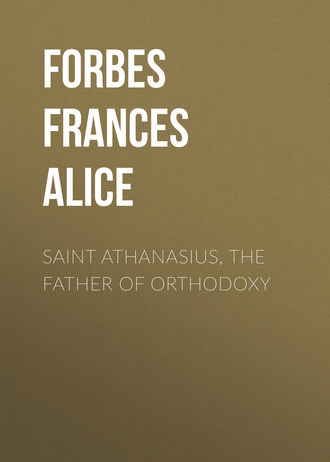 полная версия
полная версияSaint Athanasius, the Father of Orthodoxy

F. A. Forbes
Saint Athanasius, the Father of Orthodoxy
"Jesus said to them: Amen, Amen I say to you, before Abraham was
made, I am."
– John 8:58
"In the beginning was the Word, and the Word was with God, and the
Word was God. The same was in the beginning with God… And the
Word was made flesh, and dwelt among us."
– John 1:14
Nihil Obstat: J.N. Strassmaier, S.J.
Censor Deputatus
Imprimatur: Edmund Canon Surmont
Vicar General
Westminster
August 5, 1919
Originally published in 1919 by R. & T. Washbourne, Ltd., London, as part of the series Standard-bearers of the Faith: A Series of Lives of the Saints for Young and Old.
"Born of the Father before all ages, God of God, Light of Light,
true God of true God, begotten not made, consubstantial with the
Father.. "
SAINT ATHANASIUS– From the Nicene Creed
"I and the Father are one."
– Words of Our Lord (John 10:30)
Chapter 1 A FORESHADOWING
THE Patriarch of Alexandria, Egypt was expecting company. He stood at the window of his palace looking down the long road, that at the first sign of his guests' arrival he might go forth and welcome them. Before him, like a white pearl in the blue waters of the Mediterranean, lay the city of Alexandria – "the beautiful," as men loved to call it. Across the harbor the marble tower of the great lighthouse soared up into the clear Eastern sky, white as the white cliffs of the Island of Pharos from which it sprang. It was noonday, and the sunshine lay like a veil of gold over all.
The Patriarch's thoughts were wandering in the past. He had been celebrating the anniversary of his holy predecessor Peter, the previous Bishop, who had won the crown of martyrdom during the terrible persecution of the Christians not so many years before. Several of the clergy present had come from afar to assist at the festival, and these were to be his expected guests.
The time of suffering was past and over, and yet it seemed to Alexander as if it had all happened yesterday and might happen again tomorrow. There stood the great palace of the Caesars, where the pagan emperor had sat in judgment upon the lambs of Christ's flock; there the famous temple of Serapis, where the Christians had been dragged to offer incense to the gods; there the amphitheater where they had been torn to pieces by beasts and slain with the sword for confessing the Name of Christ. And all through those dark days, firm and steadfast as the lighthouse on the cliffs of Pharos, had stood the Patriarch Peter, a tower of strength and comfort to his persecuted children.
A hundred Bishops and more had looked to him as their head, for the See of Alexandria in the East was second only to that of Rome in the West, and the burden of responsibility was heavy. But, thanks to the example of its chief, the Church in Egypt had borne the trial bravely, and if some had quailed before the torture and the rack and had fallen away, by far the greater number had been true. Even the unheroic souls, who had loved their lives better than their God, had not been lost beyond hope, for they had come back during the lulls in the storm, begging to be absolved from their sin. And Peter, mindful of his Master's words that he should not quench the smoking flax nor break the bruised reed, received them back, after they had done penance, into the fold of Christ with mercy and compassion.
There were some who had not scrupled to protest against such mercy. "Were these apostates," cried Meletius, Bishop of Lykopolis, "to be made equal to those who had borne the burden and the heat of the day?" And he had rebelled against the decision of the Patriarch and made a schism in the Church. Even the martyrdom of the holy Peter had not brought him back to his allegiance: the Meletians were rebels still, to the crying scandal of Christians and pagans alike.
They were a hard people to govern, these Alexandrians – subtle, passionate and unstable, ready to follow any preacher of novelties. Alexander half envied Peter his martyr's crown as he stood musing over the past.
What was delaying his guests? he wondered, as he looked down the long road, where there was as yet no sign of them.
On the shore, at a little distance, a group of boys were playing, their bare legs and white tunics flashing hither and thither as they ran. One of them, a tall slim lad, whose aureole of ruddy hair seemed to catch every wandering sunbeam, was evidently directing the game, for all seemed to look to him for orders. "A leader of men," smiled the Patriarch to himself, as a vigorous wave of the boy's hand brought all his companions round him.
They were building some kind of a platform now, on to which he of the ruddy locks was promptly hoisted, while the others appeared to be forming a procession.
"A church ceremony," murmured the Patriarch to himself, remembering his own boyhood days. Presently a little boy advanced solemnly and presented some kind of a vessel to the youthful bishop, who, with a magnificent gesture, beckoned to the procession to approach. Then, as the foremost boy advanced and knelt at his feet, he raised the vessel and poured some of its contents over his head.
"The baptism of the catechumens!" exclaimed the Patriarch; "but this looks a good deal too much like earnest!"
Hastily calling a servant, he bade him go down to the shore and bring up the band of boys who were playing there. Summoned thus hastily to appear before authority, they approached with some uneasiness, and there was a certain amount of scuffling among them which resulted in the appearance of the would-be bishop in the forefront of the group – and where should a bishop be if not at the head of his flock?
"What were you doing down there on the shore?" asked the Patriarch.
The boy's clear eyes looked at him with interest, but without a vestige of fear.
"We were playing," he said. "It was the baptism of the catechumens. I was the bishop, and they" – pointing to his companions – were the catechumens."
"Are you a Christian?" asked Alexander.
"Yes," answered the boy proudly.
"And these?"
"Catechumens."
"What did you do?"
"I poured the water on them and said the words."
"What words?"
The boy repeated the formula in perfect Greek.
"Did you pour the water as you said the words?"
"Yes."
The Patriarch's face was troubled.
"It is a dangerous game to play at," he said. "What would you say if I told you that you had really baptized them?"
The boy looked at him in amazement.
"But I am not a bishop," he said.
The Patriarch could not help smiling.
"Although the bishop usually does baptize the catechumens," he said, "it is not necessary that it should be a bishop, not even necessary that it should be a priest."
The boy-bishop looked grave, his companions frightened, the Patriarch thoughtful.
"What is your name?" he asked suddenly, laying his hand on the ruddy locks.
"Athanasius," answered the boy.
"What would you like to be?" he asked.
"A priest," was the prompt answer.
"A bishop perhaps?" asked Alexander with a smile; "you think it is an easy and a glorious life?"
The boy's eyes looked straight into the Patriarch's.
"The blessed Peter was a martyr," he answered.
"You need much learning to be a priest."
"I love learning," said the boy.
Alexander noted the broad, intelligent brow, the keen eyes and the clear-cut face before him. His heart went out to this frank and fearless lad who loved the martyrs.
"Come to me this evening, and we will talk of this," he said, for his guests were at last to be seen approaching, and his duty lay with them.
That evening the boy and the Patriarch had much to say to each other as they walked under the palm trees in the garden of the episcopal palace. Alexander learned how Athanasius had been brought up in the Christian Faith under the shadow of the great persecution, among those who counted it the highest honor to shed their blood for Christ. He had been well taught in the famous Greek schools of Alexandria and was full of enthusiasm for the great Greek philosophers and poets. Strong of will, noble of heart and keen of intellect, the boy was born to something great – of that the Patriarch felt assured. The Church had need of such men in these troublous times, when the dangers of heresy had succeeded to those of persecution.
Alexander at once resolved to take Athanasius into his household and to bring him up as his own son, an inspiration for which he was often to thank God in the years to come. The boy soon grew to love the gentle and holy Patriarch, who could act with such strength and decision when it was needful for the good of the Church. He was constantly in touch with men of every rank and country, for Alexandria was a city where people of all nations and of all creeds met. Pagans, Jews and Christians lived side by side in their various quarters; there even existed a set of philosophers who tried to make a religion for themselves out of an amalgamation of several others.
Athanasius was still very young when he began to act as secretary to the Patriarch, accompanying him on all his journeys throughout his vast diocese; and he himself tells us how he stayed for a time among the monks in the desert of Egypt and how his young soul was set on fire by the holiness of their lives.
Neither science nor logic nor philosophy offered any difficulty to the brilliant young scholar, whose knowledge of Scripture and of theology was to astonish the men of his time. Alexander himself as he grew older leaned more and more on Athanasius, consulting him, young as he was, on the most important matters. So the years rolled on, and the boy grew into manhood, "gentle and strong," as we are told by one who knew him, "high in prowess, humble in spirit, full of sympathy, angelic in mind and face." That he would make his mark on the world of his time, few who knew him doubted; but of the dauntless soldier-spirit that slumbered behind that gentle mien, of the steadfast will that no human power could shake, they knew but little. God's moment had not yet come.
Chapter 2 ARIUS THE HERESIARCH
THE night before the martyrdom of the Patriarch Peter, as he had lain in prison praying and waiting for that dawn which was to be his last on earth, there had come to him a few of his faithful clergy. They had braved many dangers to look once more upon the face of their beloved Bishop and to obtain his blessing and his last instructions; they had come also to plead for one who had asked their help.
But a short time before, a certain man called Arius had been excommunicated by the Patriarch for having joined the schism of Meletius. He it was who that very day had visited them, beseeching them with tears to use their influence with Peter to obtain his pardon. The clerics knew the tenderness of their Bishop's heart and his readiness to forgive the erring; they were therefore greatly surprised when their petition met with a stern refusal.
"Never," said Peter. "Arius is separated from the glory of the Son of
God both in this world and in the next."
Then, as Achillas and Alexander, his dearest and most intimate friends, had drawn him apart to ask the reason for such unusual severity —
"This night," he said, "as I prayed, Our Lord appeared to me in glory, but His robe was rent from top to bottom. 'Who has treated Thee thus, my Lord!' I cried, 'and rent Thy garments?'
"'It is Arius,' He replied, 'who has torn My robe, and tomorrow they will come to you to intercede for him. Therefore I have warned you to keep him from the fold. But you shall die for Me tomorrow.'"
Then Achillas and Alexander, and they that were with them, prayed once more with their Bishop, and he blessed them and bade them depart in peace. And when the morning came, the promise of Christ was fulfilled, and His faithfu1 servant received the martyr's crown.
Achillas succeeded Peter as Patriarch, and in course of time, yielding to the entreaties of Arius and deceived by his apparent good faith, he received him back into the fold and gave him charge of one of the largest churches in Alexandria in a district called Baukalis.
Tall and striking in appearance, with a certain eloquence and a great pretense of holiness, Arius soon became a popular preacher. He had even hoped, it was said, to succeed Achillas as Patriarch; and when, on the death of Achillas, Alexander was elected to take his place, Arius' anger and envy knew no bounds. Since he could find no fault with the conduct of the new Patriarch, whom everyone acknowledged to be blameless and holy, he proceeded to find fault with his doctrine. "In teaching that Christ was the Eternal Son of God," said the priest of Baukalis, "Alexander and his clergy made a great mistake. Since Christ was the creation of God the Father, how could He Himself be God?"
It was a heresy that struck at the very roots of Christianity. Alexander remembered, too late, the warning of Peter. Gentle and peaceful by nature, he tried at first to win Arius by kindness. "Let him explain his difficulty," he said, "and discuss the question with theologians"; but all such suggestions were met with pride and obstinacy. Arius at last sent a haughty statement of his opinions, which were condemned by nearly all the Bishops of Egypt. He was therefore deposed and forbidden to preach, but he was not the man to take his defeat humbly.
Hastening to Caesarea in Palestine, where he had influential friends, he gave himself out as "the very famous, the much suffering for God's glory, who, taught of God, has acquired wisdom and knowledge." Many were seduced by his insidious persuasions, among them Eusebius, the Bishop of Caesarea in Palestine, who, thoroughly taken in by the deceits and false holiness of the heretic, wrote a letter to Alexander in his favor.
The Patriarch replied by a detailed account of Arius' teaching and his trial, giving the reasons why the Synod had thought fit to depose him. This letter had an effect on the clergy and Bishops of Palestine which Arius was quick enough to see. He therefore retired into Syria, where he made great friends with another Eusebius, the clever and crafty Bishop of Nicomedia, who had gained an unfortunate influence over the Emperor.
It was now nearly twelve years since Constantine, himself a pagan, though the son of St. Helena, had prayed to the God of the Christians to give him the victory over his enemies. His prayers had been heard. In the brightness of the noonday sky there appeared a sign which outshone the sun in splendor – the image of the Cross of Christ. "In this sign thou shalt conquer" was traced in fiery letters across it, and the Emperor and all his army saw and believed.
With the Cross as standard, Constantine marched against his enemies and defeated them. From that day forth he became a catechumen and the protector and friend of the Christians. His first act was to publish an edict, the Edict of Milan, which gave them full liberty to practice their religion, build churches and preach. Thus the Church came forth at last from the dark night of persecution, but her life on earth is ever a warfare against the powers of evil, and other dangers lay ahead.
The Emperor began by making humane laws. He abolished the punishment of crucifixion out of reverence for the Son of God, who had died upon the Cross, put a stop to the cruel games of the arena and bettered the condition of the slaves.
Constantine's nature was really a noble one, but there was much in him still of the pagan and the barbarian. Unfortunately for himself and for the world, he fell under the influence of Eusebius, Bishop of Nicomedia.
This man, who was said to have apostatized during the persecution of Maxentius and who had intruded himself, no one quite knew how, into the See of Nicomedia, had begun by winning the good graces of Constantia, the Emperor's sister. During the time when Constantia's husband, Licinius, was at war with her brother, Eusebius was his staunch friend, upholding him in his rebellion against the Emperor; but on the defeat of Licinius, the Bishop at once transferred his friendship to the conqueror, Constantine. Bishop Eusebius resembled Arius in his want of reverence and of honesty, and had taken Arius' side against the Patriarch, Alexander, praising openly the teaching of Arius and declaring that his only wish was that all men should share his opinions. He had even dared to write in Arius' favor to the Patriarch, declaring insolently that he had been unjustly deposed.
Alexander was growing old, but the Faith was in peril; it was a moment for vigorous action. Moreover, at his side, like a faithful watchdog, stood his secretary, the young deacon Athanasius. Circular letters were sent to Pope St. Sylvester and to all the Bishops warning them of the new danger that was threatening the Church. "Since Eusebius has placed himself at the head of these apostates," wrote Alexander, "it is necessary that it should be made known to all the faithful, lest they should be deceived by their hypocrisy."
Eusebius and Arius were both astonished and disgusted at the firm attitude of the Patriarch. Athanasius was at the bottom of it, they declared, and they vowed an undying hatred against him. The Emperor Constantine, who happened at this moment to be visiting Nicomedia, where he had spent a great part of his youth, heard Eusebius' version of the story. It was only a question of words, said the wily Bishop; what was really distressing about it was the spite and the venom with which the Patriarch of Alexandria had pursued an innocent and holy man for having dared to differ from him in opinion. Arius was then presented to the Emperor as a faithful and unjustly persecuted priest, a part which he knew how to play to perfection.
It was well known to Eusebius that the great desire of Constantine was to preserve and maintain peace in his empire. If this quarrel were allowed to go on, said the Bishop, there would soon be strife throughout the whole of the East, for there was much bitterness already. On the other hand, Constantine was known to all Christians as the protector and generous benefactor of the Church. Would it not be well for him, suggested Eusebius, to use his influence for good and to write to Alexander, bidding him lay aside this most unchristian dispute and make peace with Arius and his followers? The Emperor, as Eusebius had hoped, took alarm at the prospect of disunion in his dominions. A catechumen himself, and knowing but little of the great truths of Christianity, he was easily deceived by Eusebius' story and hastened to take his advice.
It was a scandalous thing, he wrote, that the peace of the Church should be disturbed for such a trivial matter. Let Alexander and Arius forgive one another; let them each keep their own opinion if they chose, but in concord and in quiet. He ended by begging both to give him peace by making peace among themselves and by putting an end to all such quarrels.
The letter was entrusted to Hosius, Bishop of Cordova, a confessor of the Faith, venerated throughout the Church for his wisdom and holiness. He was to deliver it personally to the Patriarch of Alexandria.
Now, Hosius was a Bishop of the Western Church and had heard but vague rumors of the doings of Arius and his followers in the East. His first interview with the Patriarch of Alexandria opened his eyes to the importance of the matter. It was no question of a war of words or a difference of opinion – Christianity itself was at stake; the Emperor must be warned, and warned at once. A letter was therefore written by the two Bishops, assisted probably by Athanasius, in which the Emperor was earnestly begged to take steps to summon a universal Council of the Church to decide the question. It was dispatched to him by a trusty messenger and in due time reached his hands.
Constantine, who was really anxious to do what was right, appealed to the Pope, St. Sylvester, to unite with him in summoning a Council. To the Bishops who were too poor to undertake a long journey with the usual attendance of clergy, the Emperor offered the necessary means. He undertook also to house and provide for the members of the Council as long as it lasted. The town of Nicea in Bithynia, about twenty miles from Nicomedia, was chosen as the meeting place. It was hoped by all devout Christians that peace and unity in the Church would be the result.
Chapter 3 THE GREAT COUNCIL
IN the early summer of the year 325 the Council of Nicea met. Three hundred eighteen Bishops were present, besides a multitude of priests, deacons and acolytes. It was like the Day of Pentecost, said the people: "men of all nations and of all tongues."
Many bore the glorious marks of the sufferings they had endured for Christ; others were wasted with long years of prison. There were the hermit Bishops of Egypt, Paphnutius and Potamon, who had each lost an eye for the Faith; Paul of Neo-Caesarea, whose muscles had been burned with red-hot irons and whose paralyzed hands bore witness to the fact; Cecilian of Carthage, intrepid and faithful guardian of his flock; James of Nisibis, who had lived for years in the desert in caves and mountains; Spyridion, the shepherd Bishop of Cyprus, and the great St. Nicholas of Myra, both famed for their miracles.
Among the Bishops of the West were Theophilus the Goth, golden-haired and ruddy, who had won thousands to the Faith; and Hosius the Spaniard, known as "the holy," who had been named by the Pope as his representative; together with the two Papal Legates, Vito and Vincent. Among those of the Eastern Church were the venerable St. Macarius, Bishop of Jerusalem, and St. Amphion, who had been put to the torture in the reign of Diocletian.
Last but not least came the aged Patriarch of Alexandria, the chief prelate of the Eastern Church, who had brought with him as his assistant the young deacon Athanasius.
Of the 318 Bishops present, seventeen, headed by Eusebius of Nicomedia, were in sympathy with Arius. They were but a small number, it is true, yet Eusebius was the adviser of Constantine and the friend of his sister Constantia. He relied on his influence with the Emperor and his well-known powers of persuasion.
***The day has come for the opening of the Council. The Bishops and clergy are assembled in a great hall which has been prepared for this purpose. In the center, upon a splendid throne, lies a copy of the Four Gospels, symbol of the presence of Christ in the midst of His Church. At the upper end a small gilt throne has been erected for the Emperor, while the Bishops and the clergy sit on seats and benches running the whole way around the hall.
A quick whisper suddenly breaks the silence: "The Emperor!" and the whole assembly rises to its feet. Few of those present have seen the man whose name is on every lip, a Caesar and a Christian!
Alone and unattended, with bent head and humble mien, the Emperor crosses the threshold. A man of noble presence and of royal dignity, he wears the robe of Imperial purple blazing with gold and precious stones; the Imperial crown is on his head. There are some there who have seen that Imperial purple before, but under what different circumstances – "Hail, Caesar; those about to die salute thee!"
He advances slowly and with faltering footsteps between the ranks of Bishops standing to do him honor. Constantine the Great, the conqueror of the Roman world, trembles in the presence of these intrepid Confessors of the Faith who bear upon them the marks of the conflict. In the midst of that august assembly he, the catechumen, is as a little child. He will not even take his seat upon the throne prepared for him until the Bishops urge him to do so.
The Emperor speaks to them with deference and courtesy. It is not for him, he says, to dictate to them, for here he is but fellow servant with them of a glorious Lord and Master. They had met to preserve peace and concord in the Church and to put an end to all causes of strife. Let them do what they can to that end.
There are two men in that assembly on whom all eyes are bent. One of them is about sixty years of age, tall, thin and poorly clad, as one who leads an austere life. A wild shock of hair overshadows his face, which is of a deathly pallor; his eyes are usually downcast, owing to a weakness of sight. He has a curious way of writhing when he speaks, which his enemies compare to the wriggling of a snake. He is given to fits of frenzy and wild excitement, but has withal, when he chooses, a most winning and earnest manner, fascinating to men and women alike – Arius the heresiarch.





